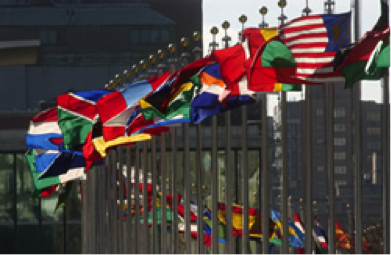The third and final Preparatory Committee (PrepCom) for the 2015 Review Conference of the Treaty on the Non-Proliferation of Nuclear Weapons (NPT) opened on Monday 28 April 2014. Some 70 delegations registered to deliver statements during the General Debate. Despite ongoing international developments that have created tensions among various states, the mood on the opening day was relaxed and constructive, writes SIPRI's Tariq Rauf.
 Recap: about the PrepCom
Recap: about the PrepCom
In his opening remarks, the Chair of the 2014 Preparatory Committee, Ambassador Enrique Román-Morey of Peru, stated that the PrepCom is a mutually shared responsibility.
In terms of the work of the PrepCom, in Decision I on Strengthening the Review Process for the Treaty adopted at the 1995 Review and Extension Conference, states parties decided that the 'purpose of the Preparatory Committee meetings would be to consider principles, objectives and ways in order to promote the full implementation of the Treaty, as well as its universality, and to make recommendations thereon to the Review Conference' and that these 'meetings should also make the procedural preparations for the next Review Conference'.
Furthermore, at the 2000 NPT Review Conference, states parties adopted the Final Document which inter alia included 'improving the effectiveness of the strengthened review process for the Treaty', that stipulates that at its third and, as appropriate, fourth sessions, the PrepCom, taking into account the deliberations and results of its previous sessions, should make every effort to produce a consensus report containing recommendations to the Review Conference.
Accordingly, with the proactive cooperation of all delegations, the Chair trusts that these mandates can be fulfilled and in so doing make a positive contribution to the 2015 Review Conference. He stated that he could accept that the 'D' in disarmament is substituted for the 'D' in deterrence, and as such it is the responsibility of all NPT states to implement all aspects of the NPT, in particular its disarmament obligations.
Highlights from the first day
A draft agenda was adopted for the 2015 NPT Review Conference, which is an updated version of the agenda for the 2010 conference and includes a reference to the final document of the 2010 Review Conference, in addition to the outcomes of the 2000 and the 1995 conferences. In doing so, by front loading adoption of some of the procedural arrangements for the 2015 NPT Review Conference, the Chair is completing part of the mandate of the PrepCom on the first day and thus guarding against deadlock should that transpire during the second week.
The UN High Representative for Disarmament Affairs, Angela Kane, highlighted the importance of the NPT. She noted that when the Eighteen Nation Disarmament Committee (ENDC) took up negotiations on the NPT in 1965, it had just spent three years negotiating various proposals for general and complete disarmament on the basis of principles agreed to in 1961 by the Soviet Union and the United States. Those principles were remarkable for their ambition. They foresaw that, as a consequence of the negotiations, States should be left with only such non-nuclear arms, forces, facilities and establishments that were agreed to be necessary to protect the personal security of citizens and to support a UN peace force.
Kane continued that as we are all aware, the ENDC and its successors were never able to resume negotiations on the basis of the 1961 principles. The NPT, however, did enshrine an international obligation to negotiate in good faith on effective measures relating to the cessation of the arms race at an early date and to nuclear disarmament as well as to a treaty on general and complete disarmament. While general and complete disarmament has since been regarded as the ultimate objective of states, the arguably more modest objective of nuclear disarmament has remained the urgent priority. It is incumbent on all states parties to take bold steps to accomplish that goal in good faith and with the necessary level of ambition and resolve.
Some 30 delegations took the floor to make opening statements during the General Debate. The full texts of all statements have been posted on the UN NPT website.
Assessment and looking ahead
Thus far, the PrepCom is proceeding in a positive atmosphere with states delivering their opening statements. The statements in their tone and tenor are in the usual format with no surprises as yet. All statements, whether from the NAM or from the Western Group have focused on the three pillars of the Treaty. Differences in emphasis and views are on the pace and extent of nuclear disarmament, the delay in the convening of the conference on the establishment of a zone free of nuclear and other WMD in the Middle East, and on the humanitarian consequences of nuclear weapons.
The General Debate will continue on Tuesday, and the NGOs will have their say in the afternoon. The cluster discussions will commence on Wednesday. The Chair announced in the morning that he would circulate his first draft of the recommendations to the Review Conference on Friday—this not surprisingly has generated some excitement and early concern about its tone and content.